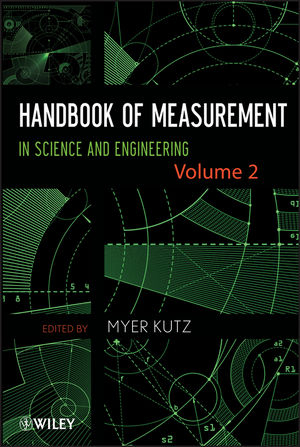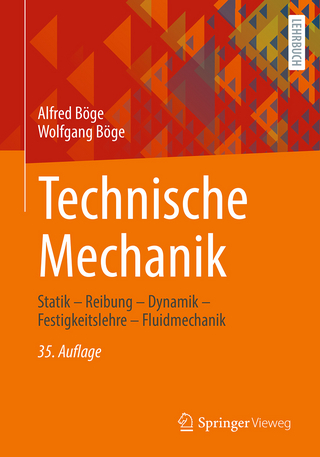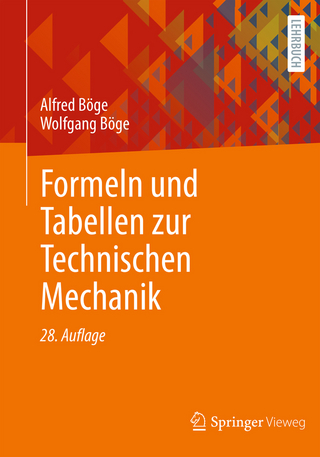
Handbook of Measurement in Science and Engineering, Volume 2
John Wiley & Sons Inc (Verlag)
9781118384640 (ISBN)
A multidisciplinary reference of engineering measurement tools, techniques, and applicationsVolume 2
"When you can measure what you are speaking about, and express it in numbers, you know something about it; but when you cannot measure it, when you cannot express it in numbers, your knowledge is of a meager and unsatisfactory kind; it may be the beginning of knowledge, but you have scarcely in your thoughts advanced to the stage of science." Lord Kelvin
Measurement falls at the heart of any engineering discipline and job function. Whether engineers are attempting to state requirements quantitatively and demonstrate compliance; to track progress and predict results; or to analyze costs and benefits, they must use the right tools and techniques to produce meaningful, useful data.
The Handbook of Measurement in Science and Engineering is the most comprehensive, up-to-date reference set on engineering measurementsbeyond anything on the market today. Encyclopedic in scope, Volume 2 spans several disciplinesMaterials Properties and Testing, Instrumentation, and Measurement Standardsand covers:
Viscosity Measurement
Corrosion Monitoring
Thermal Conductivity of Engineering Materials
Optical Methods for the Measurement of Thermal Conductivity
Properties of Metals and Alloys
Electrical Properties of Polymers
Testing of Metallic Materials
Testing and Instrumental Analysis for Plastics Processing
Analytical Tools for Estimation of ParticulateComposite Material Properties
Input and Output Characteristics
Measurement Standards and Accuracy
Tribology Measurements
Surface Properties Measurement
Plastics Testing
Mechanical Properties of Polymers
Nondestructive Inspection
Ceramics Testing
Instrument Statics
Signal Processing
Bridge Transducers
Units and Standards
Measurement Uncertainty
Data Acquisition and Display Systems
Vital for engineers, scientists, and technical managers in industry and government, Handbook of Measurement in Science and Engineering will also prove ideal for members of major engineering associations and academics and researchers at universities and laboratories.
MYER KUTZ holds engineering degrees from MIT and RPI. He was vice president and general manager of Wiley's STM Division and has consulted and/or authored for most of the major professional and technical publishing houses. He is the author of nine books and the editor of more than a dozen handbooks.
VOLUME 2
PREFACE xxiii
CONTRIBUTORS xxvii
PART IV MATERIALS PROPERTIES AND TESTING 945
31 Viscosity Measurement 947
Ann M. Anderson, Bradford A. Bruno, and Lilla Safford Smith
31.1 Viscosity Background, 947
31.2 Common Units of Viscosity, 949
31.3 Major Viscosity Measurement Methods, 959
31.4 ASTM Standards for Measuring Viscosity, 974
31.5 Questions to Ask When Selecting a Viscosity Measurement Technique, 976
References, 979
32 Tribology Measurements 981
Prasanta Sahoo
32.1 Introduction, 982
32.2 Measurement of Surface Roughness, 983
32.3 Measurement of Friction, 988
32.4 Measurement of Wear, 992
32.5 Measurement of Test Environment, 994
32.6 Measurement of Material Characteristics, 998
32.7 Measurement of Lubricant Characteristics, 1001
32.8 Wear Particle Analysis, 1004
32.9 Industrial Measurements, 1005
32.10 Summary, 1006
33 Corrosion Monitoring 1007
Pierre R. Roberge
33.1 What is Corrosion Monitoring?, 1007
33.2 The Role of Corrosion Monitoring, 1008
33.3 Corrosion Monitoring System Considerations, 1010
References, 1116
34 Surface Properties Measurement 1121
Mrinalini Mulukutla and Sandip P. Harimkar
34.1 Introduction, 1121
34.2 Surface Properties, 1122
34.3 Microstructural Analysis, 1125
34.4 Compositional Analysis, 1128
34.5 Phase Analysis, 1130
34.6 Mechanical Testing, 1131
34.7 Corrosion Properties, 1141
34.8 Standards for Surface Engineering Measurement, 1145
References, 1147
35 Thermal Conductivity of Engineering Materials 1151
Juergen Blumm
35.1 Introduction, 1151
35.2 Stationary Methods for Measurement of the Thermal Conductivity, 1157
35.3 Transient Methods for the Measurement of the Thermal Conductivity, 1163
35.4 Test Results on Various Engineering Materials, 1173
References, 1188
36 Optical Methods for the Measurement of Thermal Conductivity 1189
Prabhakar R. Bandaru and Max S. Aubain
36.1 Thermal Boundary Resistance May Limit Accuracy in Contact-Based Thermal Conductivity (k) Measurements, 1189
36.2 Optical Measurements of k May Avoid Contact-Related Issues, 1192
36.3 Thermoreflectance (TR), 1196
36.4 Characteristics of Thermoreflectance from Si Thin Films—Modeling and Calibration, 1199
36.5 Experimental Procedures, 1202
36.6 Results and Discussion, 1204
36.7 Summary and Outlook, 1208
Acknowledgments, 1209
References, 1209
37 Selection of Metals for Structural Design 1213
Matthew J. Donachie
37.1 Introduction, 1214
37.2 Common Alloy Systems, 1215
37.3 What are Alloys and What Affects their Use?, 1215
37.4 What are the Properties of Alloys and How are Alloys Strengthened?, 1218
37.5 Manufacture of Alloy Articles, 1221
37.6 Alloy Information, 1221
37.7 Metals at Lower Temperatures, 1231
37.8 Metals at High Temperatures, 1233
37.9 Melting and Casting Practices, 1236
37.10 Forging, Forming, Powder Metallurgy, and Joining of Alloys, 1242
37.11 Surface Protection of Materials, 1245
37.12 Postservice Refurbishment and Repair, 1248
37.13 Alloy Selection: A Look at Possibilities, 1249
37.14 Level of Property Data, 1252
37.15 Thoughts on Alloy Systems, 1252
37.16 Selected Alloy Information Sources, 1259
Further Readings, 1261
38 Mechanical Properties of Polymers 1263
Daniel Liu, Jackie Rehkopf, and Maureen Reitman
38.1 Microstructure and Morphology of Polymers—Amorphous Versus Crystalline, 1264
38.2 General Stress–Strain Behavior, 1265
38.3 Viscoelasticity, 1271
38.4 Mechanical Models of Viscoelasticity, 1272
38.5 Time–Temperature Dependence, 1274
38.6 Deformation Mechanisms, 1274
38.7 Crazing, 1277
38.8 Fracture, 1279
38.9 Modifying Mechanical Properties, 1284
38.10 Load-Bearing Applications: Creep, Fatigue Resistance, and High Strain Rate Behavior, 1285
References, 1290
39 Electrical Properties of Polymers 1291
Evaristo Riande and Ricardo Diaz-Calleja
39.1 Introductory Remarks, 1291
39.2 Polarity and Permittivity, 1292
39.3 Measurements of Dielectric Permittivity, 1293
39.4 Polarization and Dipole Moments in Isotropic Systems, 1297
39.5 Thermostimulated Depolarization Currents, 1316
39.6 Conductivity in Polyelectrolytes and Polymer-Electrolytes as Separators for Low Temperature Fuel Cells and Electrical Batteries, 1318
39.7 Semiconductors and Electronic Conducting Polymers, 1324
39.8 Ferroelectricity, Pyroelectricity, and Piezoelectricity in Polymers, 1328
39.9 Nonlinear Polarization in Polymers, 1331
39.10 Elastomers for Actuators and Sensors, 1333
39.11 Electrical Breakdown in Polymers, 1336
References, 1338
40 Nondestructive Inspection 1343
Robert L. Crane and Jeremy S. Knopp
40.1 Introduction, 1344
40.2 Liquid Penetrants, 1347
40.3 Radiography, 1351
40.4 Ultrasonic Methods, 1361
40.5 Magnetic Particle Method, 1370
40.6 Thermal Methods, 1373
40.7 Eddy Current Methods, 1375
References, 1410
41 Testing of Metallic Materials 1413
Peter C. McKeighan
41.1 Mechanical Test Laboratory, 1414
41.2 Tensile and Compressive Property Testing, 1418
41.3 Creep and Stress Relaxation Testing, 1420
41.4 Hardness and Impact Testing, 1422
41.5 Fracture Toughness Testing, 1425
41.6 Fatigue Testing, 1429
41.7 Other Mechanical Testing, 1433
41.8 Environmental Considerations, 1434
Acknowledgments, 1436
References, 1436
42 Ceramics Testing 1437
Shawn K. McGuire and Michael G. Jenkins
42.1 Introduction, 1437
42.2 Mechanical Testing, 1438
42.3 Thermal Testing, 1451
42.4 Nondestructive Evaluation Testing, 1458
42.5 Electrical Testing, 1460
42.6 Summary, 1461
References, 1461
43 Plastics Testing 1463
Vishu Shah
43.1 Introduction, 1464
43.2 Mechanical Properties, 1464
43.3 Thermal Properties, 1481
43.4 Electrical Properties, 1484
43.5 Weathering Properties, 1488
43.6 Optical Properties, 1492
Further Readings, 1496
44 Testing and Instrumental Analysis for Plastics Processing: Key Characterization Techniques 1499
Maria del Pilar Noriega
44.1 FTIR Spectroscopy, 1499
44.2 Chromatography (GC, GC-MSD, GC-FID, and HPLC), 1500
44.3 DSC and Thermogravimetry (TGA), 1510
44.4 Rheometry, 1518
References, 1527
45 Analytical Tools for Estimation of Particulate Composite Material Properties 1529
Tarek I. Zohdi and Magd E. Zohdi
45.1 Introduction, 1529
45.2 Concepts in Statistical Quality Control, 1530
45.3 Effective Property Estimates, 1531
45.4 Summary, 1535
References, 1537
PART V INSTRUMENTATION 1539
46 Instrument Statics 1541
Jerry Lee Hall, Sriram Sundararajan, and Mahmood Naim
46.1 Terminology, 1541
46.2 Static Calibration, 1544
46.3 Statistics in the Measurement Process, 1547
References, 1570
47 Input and Output Characteristics 1573
Adam C. Bell
47.1 Introduction, 1574
47.2 Familiar Examples of Input–Output Interactions, 1575
47.3 Energy, Power, Impedance, 1578
47.4 Operating Point of Static Systems, 1586
47.5 Transforming the Operating Point, 1598
47.6 Measurement Systems, 1602
47.7 Distributed Systems in Brief, 1607
47.8 Concluding Remarks, 1609
References, 1610
48 Bridge Transducers 1611
Patrick L. Walter
48.1 Terminology, 1612
48.2 Flexural Devices in Measurement Systems, 1612
48.3 The Resistance Strain Gage, 1615
48.4 The Wheatstone Bridge, 1625
48.5 Resistance Bridge Balance Methods, 1634
48.6 Resistance Bridge Transducer Measurement System Calibration, 1636
48.7 Resistance Bridge Transducer Measurement System Considerations, 1646
48.8 AC Impedance Bridge Transducers, 1655
References, 1660
Further Readings, 1661
49 Signal Processing 1663
John Turnbull
49.1 Frequency-Domain Analysis of Linear Systems, 1663
49.2 Basic Analog Filters, 1666
49.3 Basic Digital Filter, 1672
49.4 Stability and Phase Analysis, 1680
49.5 Extracting Signal from Noise, 1682
References, 1683
50 Data Acquisition and Display Systems 1685
Philip C. Milliman
50.1 Introduction, 1686
50.2 Data Acquisition, 1687
50.3 Process Data Acquisition, 1688
50.4 Data Conditioning, 1691
50.5 Data Storage, 1699
50.6 Data Display and Reporting, 1704
50.7 Data Analysis, 1707
50.8 Data Communications, 1708
50.9 Other Data Acquisition and Display Topics, 1712
50.10 Summary, 1715
References, 1715
PART VI MEASUREMENT STANDARDS 1517
51 Mathematical and Physical Units, Standards, and Tables 1719
Jack H. Westbrook
51.1 Symbols and Abbreviations, 1720
Bibliography for Letter Symbols, 1731
Bibliography for Graphic Symbols, 1737
51.2 Mathematical Tables, 1742
51.3 Statistical Tables, 1765
51.4 Units and Standards, 1775
Bibliography for Units and Measurements, 1802
51.5 Tables of Conversion Factors, 1802
51.6 Standard Sizes, 1833
51.7 Standard Screws, 1886
52 Measurement Uncertainty 1911
David Clippinger
52.1 Introduction, 1911
52.2 Literature, 1914
52.3 Evaluation of Uncertainty, 1915
52.4 Discussion, 1924
Disclaimer, 1924
References, 1925
53 Measurements 1927
E. L. Hixson and E. A. Ripperger
53.1 Standards and Accuracy, 1927
53.2 Impedance Concepts, 1930
53.3 Error Analysis, 1935
References, 1942
INDEX I-1
| Verlagsort | New York |
|---|---|
| Sprache | englisch |
| Maße | 188 x 262 mm |
| Gewicht | 1996 g |
| Themenwelt | Technik ► Bauwesen |
| Technik ► Elektrotechnik / Energietechnik | |
| Technik ► Maschinenbau | |
| ISBN-13 | 9781118384640 / 9781118384640 |
| Zustand | Neuware |
| Informationen gemäß Produktsicherheitsverordnung (GPSR) | |
| Haben Sie eine Frage zum Produkt? |
aus dem Bereich


